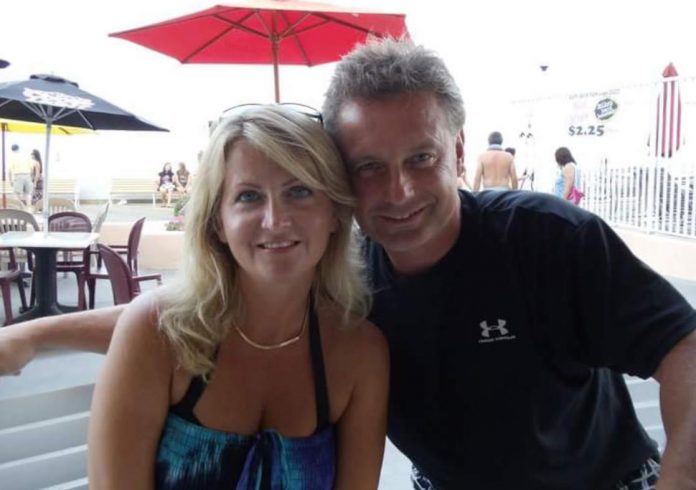Sgt. Donald Markham was shot by someone else at point-blank range in his home in 2015 before the scene was staged to appear to be a suicide, a forensic pathologist hired by the FBI concluded in a report obtained Thursday by the Chicago Tribune.
The five-page report contradicts Cook County officials’ ruling that Markham had shot himself in September 2015 after a drunken argument with his wife, Dina, also a veteran Chicago cop. The report was part of a yearlong probe by the FBI, which began after questions were raised within the Chicago Police Department about Markham’s death.
The mystery deepened last May when Dina Markham, 47, was herself found dead, submerged in a bathtub in the couple’s home in the 5900 block of North Newark Avenue. Her death, ruled an accidental drowning by the Cook County medical examiner’s office, occurred before the FBI was able to interview her.
As part of its probe, the FBI hired forensic pathologist Scott Denton to review the autopsy reports and photos from the scene of Markham’s death. Denton, a former chief interim medical examiner for Cook County, works in a private capacity in downstate Bloomington.
Denton’s report — submitted to the FBI last February — found a number of troubling aspects about the scene that led him to conclude the shooting was, in fact, a homicide, or “death at the hands of another.” Among the clues, he said, were blood patterns indicating Markham’s arms were “lifted upward after death,” the strange placement of the gun “loosely in his right hand” and a lack of small abrasions or lacerations on his index finger that typically can be seen after someone fires a gun.
“The position of his body, the blood flow pattern on his face, the blood transfer pattern on his chin and left hand under his chin, and the moved and placed appearance of the gun in his right hand are all consistent with his body having been moved after death,” Denton wrote in the report, obtained by the Tribune from the medical examiner’s office through an open records request.
The medical examiner’s office, meanwhile, has doubled down on its original ruling that Donald Markham, 51, shot himself in his own bed that night, writing in a point-by-point refutation that the FBI expert offered “creative and descriptive scenarios” that were not grounded in science.
In her nine-page rebuttal report, also made public Thursday, Chief Medical Examiner Ponni Arunkumar wrote that Denton’s analyses of the blood spatter and position of Markham’s body ignored scientific literature that a body often continues to move — or even convulse — after suffering a gunshot wound to the head.
The position of the gun in Markham’s hand was consistent with a well-known textbook on gunshot wounds showing that suicide victims often grip guns in a different way than they would if they were shooting at a target, Arunkumar wrote.
And while Donald Markham apparently left no suicide note, Arunkumar said that “neighbors, friends, colleagues and family members” of the Markhams all gave interviews indicating that the couple argued frequently and that “during these arguments they would express statements about killing themselves.”
Last month, the FBI held an unusual meeting with officials at the medical examiner’s office, detailing the bureau’s findings that called into question the suicide ruling. A medical examiner’s office spokeswoman said the initial Markham death investigation was then put through a review by 10 other pathologists with its office, who all agreed with the original finding of suicide.
The Tribune reported Sunday that the FBI concluded its probe into Markham’s death after that meeting and that no federal charges would be sought.
But the case is far from over. Officers and detectives who were present at the scene of Donald Markham’s death have been interviewed by prosecutors with the Cook County state’s attorney’s office as part of a parallel investigation, the Tribune has reported. Also pending is a separate probe by Chicago Inspector General Joseph Ferguson, who launched his own investigation early last year focusing on whether any city administrative rules or codes of conduct were violated.
Among the issues that could be problematic is why detectives waited to call the medical examiner’s office to report the death by the time they were already en route with Markham’s body. It is general practice for medical examiner investigators to go to crime scenes. And county ordinance requires that law enforcement seek permission from the medical examiner’s office before removing a body.
Another questionable decision made at the scene was the removal of a bloodstained mattress. Though Markham was transferred to the medical examiner wrapped in a bloody sheet from the bed, the mattress itself was disposed of that night by a Chicago Streets and Sanitation crew.
In her report, Arunkumar’s revealed that the FBI had also asked the medical examiner’s office to address the location of the spent shell casing from Markham’s .380-caliber Glock pistol, which was seen in crime scene photos on the bed near a blood-stained pillow.
Arunkumar responded that the location of the shell casing was “fully consistent with a self-inflicted gunshot wound.”
She also took issue with Denton’s suggestion that Chicago police had influenced its findings by classifying the case early on as a suicide. If anyone was biased, Arunkumar said, it was Denton, who appeared to “backfill a justification for a determination of homicide as a manner of death when the evidence is simply not there.”
A spokesman for the Markham family, Jim Bastian, could not be reached for comment Thursday, but he told the Tribune in a statement last week that the family has believed all along that Donald Markham’s death was a tragic suicide.
Bastian acknowledged, however, that there appeared to be legitimate concerns about how Chicago police handled the investigation.
“It’s unfortunate because a lot of heartache could have been avoided,” he said.
Donald and Dina Markham had been out drinking at the Firewater Saloon in Edison Park until 1 a.m. on Sept. 2, 2015, according to statements Dina Markham gave to police. She said her husband blamed her for keeping them out so late and that a quarrel that began in the car continued as they arrived home, records show.
According to police reports, Dina Markham said she walked away from the house, and her husband eventually locked her out. About 15 minutes later, she returned to the home and was unable to get inside, according to the police reports. She then knocked on a window and asked one of her children to open the front door.
Once inside, she started searching for her car keys because she planned to sleep in her car, the report said. She entered their bedroom and saw her husband lying on his side in the bed, his back toward her. Markham said she started feeling around his pockets in search of the keys but felt moisture instead. Realizing it was blood, Markham called 911 just after 3 a.m.
On the calls, a distraught Markham begged operators to send help but was unable to answer questions about what happened.
“Please hurry!” she implored in her first 911 call. “He’s a PO (police officer). … There’s blood all over the bed.”
Officers found Donald Markham lying on the bed in the master bedroom suffering from a “contact” gunshot wound to his right temple, according to police and medical examiner’s office reports. Markham’s pistol was still in his right hand, with five bullets in the clip and one in the chamber, according to the reports.
Markham had gunshot residue on his hand, indicating he’d either fired or was close to the weapon when it was fired. Although Dina Markham was the one who reportedly found her husband’s body, her hands were never tested for gunshot residue, records show.
The medical examiner’s office did not conduct its own investigation at the scene because detectives didn’t contact the office about the death until almost 5:30 a.m., at least two hours after the incident. By then, Markham’s body was being transported to the morgue in a police wagon.
Two months later, on Nov. 13, 2015, Chicago police officially closed their investigation into Donald Markham’s death under the classification “non-criminal,” police reports showed.































